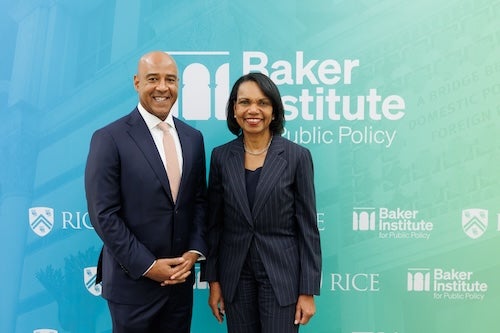Former U.S. Secretary of State Condoleezza Rice spoke with Rice University’s Baker Institute for Public Policy Director David Satterfield at an event in the Brockman Hall for Opera’s Morrison Theater Feb. 15.

Rice President Reginald DesRoches welcomed Rice onto the stage with an introduction that relayed her extensive resume that spans from international relations to statecraft to football team ownership. He also presented her the Baker Prize for Excellence in Leadership.
“Condoleezza Rice is not only one of the most accomplished diplomats of her time, she is also an incredible human being who represents the very best of our nation,” he said.
Satterfield, who is currently serving as special envoy for Middle East humanitarian issues for the Biden administration, and Rice’s conversation spanned her experience growing up in racially-segregated Alabama, the state of the union, free speech, academic freedom to global leadership.
“If you look at the long history of the United States, I’m just going to take you back to one moment in my own life – which every time I think of it reinforces my faith,” Rice said. “So when you’re – as you’ll remember David – sworn in as Secretary of State, it is in the Franklin Room at the State Department. And there’s this huge portrait of Ben Franklin behind you.

“As I was standing there and the president was making some remarks – sorry I was a little distracted at that moment – I wondered ‘what would ol’ Ben think of this? Here is this Black woman taking an oath to the constitution of the United States of America to protect and defend, sworn in by a Jewish woman Supreme Court Justice named Ruth Bader Ginsberg, what would he think of this?’ Now, he’s my favorite founding father so I would like to think he would like it, but the most important thing is that he never would have imagined it,” she continued. “And frankly, I would never have imagined it in segregated Birmingham. Nor would Ruth when she was trying to get her voice heard in law school. So yes, the progress continues. We are not perfect, but we keep working toward a more perfect union.”
Watch the entire conversation on the Baker Institute’s YouTube here.

